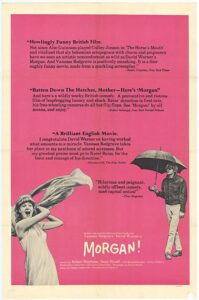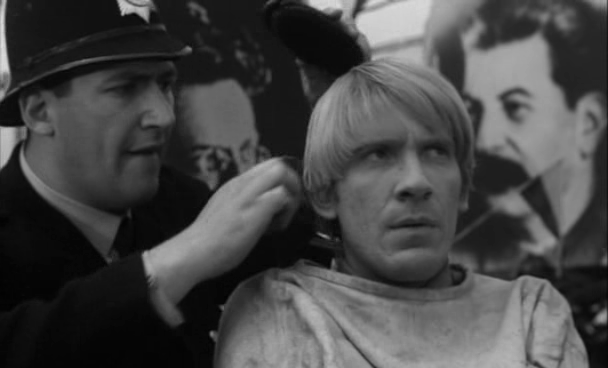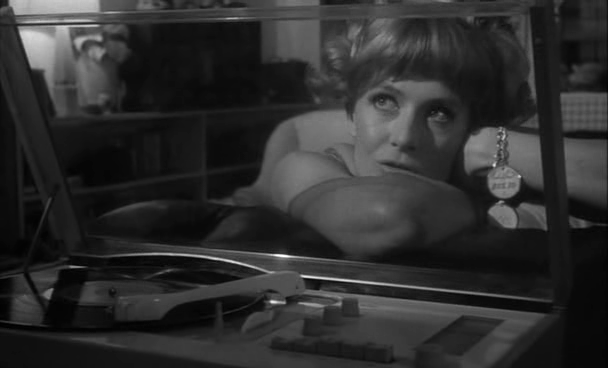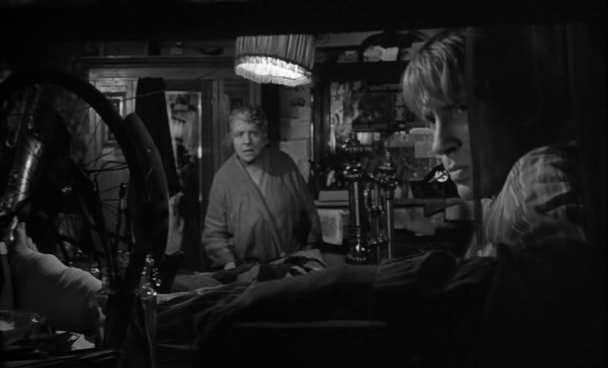Morgan!/Morgan (A Suitable Case for Treatment) (1966)
“One of these days they’ll be coming for me with a straight jacket.”
|
Synopsis: |
|
Genres, Themes, Actors, and Directors:
Response to Peary’s Review: It’s not very hard to look “past director Karel Reisz’s deceptively charming veneer” and “see that Morgan’s fantasies and wild antics are symptomatic of impending personal disaster” — and I’m not someone who will simply “cheer Morgan’s devil-may-care behavior”, or “laugh when Morgan threatens Charles”, or “ignore Leonie’s protests”. As Peary writes, “the most important aspect of this film is not how Morgan tries to win back the woman he loved and lost, but how Leonie deals with the often pathetic advances of a man she loves but can’t be with without destroying herself.” Peary goes on to state that the “picture has lost much of its following because stylistically it is extremely dated”; he argues we’ve “long overdosed on freeze frames, fast-speed photography, insertions of old movies, and juxtaposition of images signifying ‘illusion’ and ‘reality’.” I’m not sure that still holds true; but the repeated insertion of clips from Tarzan Triumphs (1943) and King Kong (1933) — as well as Morgan’s imagining the world around him as a jungle — feel forced. By the time things get fully (and tragically) ridiculous near the end of the movie, and Morgan puts on his full-body gorilla suit, it’s clear the film has gone in directions that will either resonate with viewers or not. It’s possible that this all played much fresher in the 1960s; but nowadays, one simply feels sad about Morgan’s untreated illness and frustrated at Redgrave for giving him such a long leash. Redeeming Qualities and Moments: Must See? Links: |





One thought on “Morgan!/Morgan (A Suitable Case for Treatment) (1966)”
Not must-see.
‘Morgan’ has the feel of a private joke – one that the protagonist is having on the audience. His own mother tells him, “Inside your head’s a flaming mystery to me.” It appears to be to Morgan as well. He says he was “born into the wrong species” but we never feel Morgan would be any more content as the ape he fantasizes about being than as a man.
Perhaps that’s because we’re slowly watching a man sink into madness (though the film will ultimately refrain from realistically presenting the darker reality that it builds to).
Director Reisz is completely sympathetic with his ‘hero’ and relishes Morgan’s POV of himself as a powerful gorilla – and all other members of society standing in for various members of the animal kingdom. All of that gives Reisz toys to play with visually.
Sadly, however, David Mercer’s script offers no backstory (for the main relationship), nor a reason to be all-that-concerned about what’s going on.
As Morgan, Warner is game but still (understandably) at-sea. The same is true of Redgrave, asked as she is to inexplicably run hot-and-cold in her feelings for a man who both titillates her fascination with anarchy and constantly thwarts her love of capitalism.
The ending suggests that Redgrave – in a more socially acceptable way – may be just as nutty as Warner; so perhaps it’s a genuine love story after all. (For a role she couldn’t really do all that much with, Redgrave won Best Actress at Cannes.)